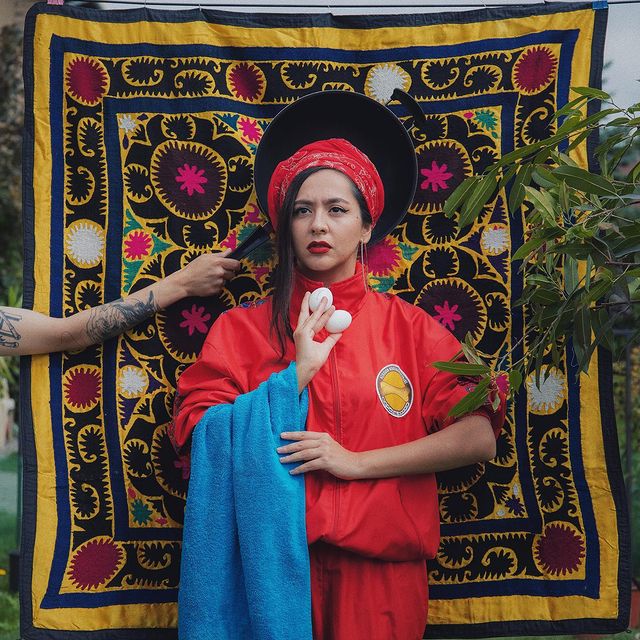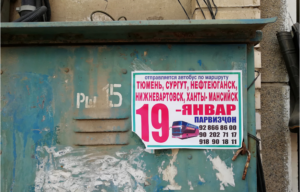Russian television viewers have chosen Manizha, a Russian singer born in Tajikistan, to represent Russia in the Eurovision Song Contest.
A version of this article was originally published on Novastan’s French website on 17 March 2021.
At the 2021 Eurovision Song Contest, Russia will be represented by the 29-year-old Manizha, a singer of Tajik origin. The singer will compete with a new feminist song, “Russian Woman”.
Manizha, who emigrated from Tajikistan in 1994, is an activist for women’s and refugee rights. The artist made herself known almost exclusively through social media, notably on Instagram where she regularly posts her new songs.
Want more Central Asia in your inbox? Subscribe to our newsletter here.
Since her nomination, Manizha has seen her account grow by tens of thousands of followers. As of 22 March, she has more than 435,000 followers. On YouTube, her videos often attract several million views.
Music as a tool for advocacy
Born in 1991, Manizha Sanghin was three-years-old when her family arrived in Moscow from Dushanbe, the capital of Tajikistan, then in the midst of a civil war (1992-1997). In an interview with Asia-Plus, she explains how it was difficult to build her career as a female immigrant in Russia. Today, she is inspired by her own experiences to contribute, thanks to her music and personal projects, to the fight for women’s and refugee rights.
On 14 December 2020, Manizha became the first goodwill ambassador for the UN Refugee Agency appointed to Russia, Radio Ozodi, the Tajik branch of the American media outlet Radio Free Europe / Radio Liberty, reported. “I promise to support those who are forced to flee their homes because of conflict and persecution, to use my voice to help those in need and to shine light upon the situation of refugees and stateless peoples,” she said in a statement.
The assertion and protection of women’s rights is also important to Manizha. In 2019, after the success of her video Mama denouncing domestic abuse, she created a mobile application, SILSILA. Developed with her mother’s help, SILSILA is a mobile alert system which allows victims of violence to call for help more easily.
Tajik: a little, a lot, too much or not enough
Despite 39.7% of Eurovision fans in Russia voting for her, criticism and insults stream forth concerning the origins and artistic style of the young woman.
Her Tajik origin is a particular focus of the hostility surrounding Manizha’s nomination. On social media, a number of people claim without evidence that the voting was rigged and that the artist does not hold Russian nationality. Others reject the feminist message of the song “Russian Women”. Its latest version, released 19 March, includes the English chorus “Every Russian woman needs to know / you’re strong you’re gonna break the wall”.
“I am a citizen of the world. I am Tajik, Slavic and a woman who speaks English. I’ve stopped worrying. I just want to live, in accordance with these traditions, in accordance with the culture that was formed within me,” Manizha told Radio Ozodi in December 2019.
Another song also evokes the discomfort caused by her dual nationality, her dual culture. The chorus of her song Nedoslavianka (“Not Slavic Enough”), for which the music video was filmed in Tajikistan, explains:
In my native land,
I am already foreign,
And in foreign lands
I am still not a native.

Beyond the feeling of not wholly belonging to either of her two communities, Manizha juggles with these influences with pride. Today she sports a unique identity. The artist repurposes folkloric rhymes and traditional Tajik clothing and in the same breath reclaims the societal concerns of the Russian people, as the America media outlet Eurasianet notes.
But some amongst the defenders of national Russian conservatism still protest, for example the leader of the Liberal-Democrat Party, Vladimir Zhirinovksy. “I don’t know if this is good for raising the authority of a Russian woman and of Russia in general. […] The song should boost moods […] Who needs a song like this?,” he told Russian journalists, the Russian media outlet Ria Novosti reports.
“Another star will rise in the sky from the stage and its name shall be Manizha”
Since her debut, Manizha has been collaborating with Russian and Tajik artists more and more. In the face of criticism, her contemporaries are keen to show their support of the young singer. “A girl of Tajik roots sings a resplendent Russian folklore, it is a cultural bridge in the relations between the states,” Iosif Prigozhin, a celebrated Russian producer, told Radio Ozodi.
In the same Radio Ozodi article, the Tajik musician Zafar Abdualimov, who shared the stage with Manizha during a singing competition in 2006, said he was proud of the young woman: “This event is a great achievement for us, for the people of Tajikistan”
Also of Tajik origin, the violinist Nohid Seinalpur takes pride in Manizha’s originality and personality setting her apart from other artists repurposing Tajik folklore. “Another star will rise in the sky from the stage and its name shall be Manizha,” she stated, lauding the fact that she “is unlike any other”.
For many, this nomination is symbolic of change in the mentality of Russians, though hate-filled reactions also bear witness to the society’s divisions. The Eurovision Song Contest is not officially political but choosing to put forth a woman whose ideas so oppose those of the Kremlin is unprecedented.
Such international visibility for an artist who uses traditional Tajik folklore, often unknown and underappreciated in the West, is also new. In this way, Manizha represents the hopes of a new emergence of Tajik culture.
As for hateful messages, Manizha hit back at them with humour. On 16 March, she published a short documentary spoof on YouTube in which an “expert” explains that, according to his research, “Manizha… is SALT!”. But she also explicitly reasserted her dual identity and how it informs her music: “I, Tajik by blood, will sing in Russian. Because I am representing Russia, a country I consider my homeland,” she told the Russian outlet Sputnik.
Caroline Deschamps
Novastan.org
Translated from French by Molly Arnold
For more news and analysis from Central Asia, follow us on Twitter, Facebook, Telegram, Linkedin or Instagram.
 Who is Manizha, the Tajik-born singer representing Russia at the Eurovision?
Who is Manizha, the Tajik-born singer representing Russia at the Eurovision? 



